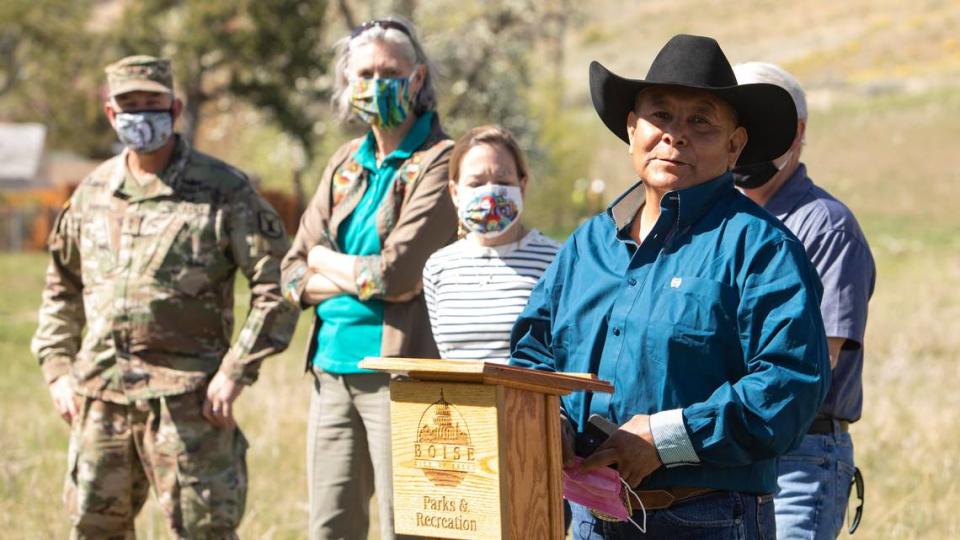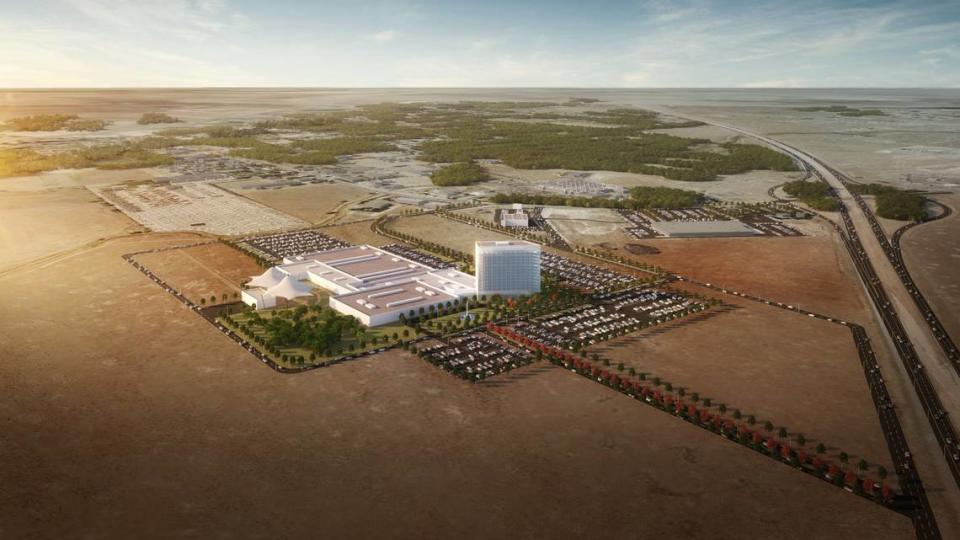A casino 45 minutes from Boise? A decision nears as tribes spar over whose it should be
Two Native American tribal groups are at odds over plans for a casino about 40 miles southeast of Boise.
The Shoshone-Bannock Tribes, based at the Fort Hall Reservation near Pocatello, bought land in Elmore County in 2020 to develop a gaming enterprise. The 154.5-acre parcel is southeast of Mountain Home and just west of Interstate 84, according to the Elmore County Assessor’s Office.
It would be the tribes’ fourth casino; the Shoshone-Bannock have two casinos on their eastern Idaho reservation and one close by in Pocatello.
But they’re not the only tribes who want to build a casino in Mountain Home.
The Shoshone-Paiute Tribes, of the Duck Valley Reservation on the Idaho-Nevada state line, are urging Idaho Gov. Brad Little and the Biden administration to reject the Sho-Bans’ proposal. Brian Mason, tribal chairman of the Sho-Pai, said the casino would be built on his tribes’ ancestral territory.
The Sho-Pai don’t have a casino on their remote reservation but have been working on plans for a gaming project in the area since the 1990s, he told the Idaho Statesman by phone.
A casino in Mountain Home, about 45 minutes southeast of Boise on Interstate 84, would draw patrons from the more than 780,000 people who live in Ada and Canyon counties, in addition to the nearly 30,000 who live in Elmore County. It would also attract travelers along the route between Boise and Twin Falls, where Mountain Home serves at a midpoint.
Idaho has Native American casinos in Lewiston, Pocatello, Kamiah, and south of Coeur d’Alene, and on the Fort Hall Reservation. In Jackpot, south of Twin Falls and the Nevada border, is a nontribal casino that includes table games. The casinos in Idaho offer video gaming and bingo, not table games like blackjack, craps and poker. The Sho-Bans’ Mountain Home casino wouldn’t have table games either.
Shoshone-Paiute tout ties to the land
Mountain Home, about 90 miles away, is one of the closest sizable cities to the Duck Valley Reservation.
The Sho-Pai go to the city to buy goods and services. For over 40 years, tribal members have been born at a hospital in Mountain Home, and elders have funeral arrangements and embalmings in the Elmore County seat, Mason said. The tribes have about 2,300 members.
“We spend our paychecks there,” he said. “We’re cradle-to-grave there. We are Mountain Home. That’s where we’re from.”

Mason said the Sho-Pai sent out a request for proposal in 2020 to other tribes and entities dealing in Indian gaming. The proposal announced their plans for a gaming operation in the area and sought partners in establishing it.
He said the more than 6,000-member Sho-Ban Tribes responded and proposed a partnership that would apportion 10% of the interest in the project to the Sho-Pai. Mason said his tribes rejected that, wanting to have senior interest in the project.
The Sho-Pai decided to partner with JTC Gaming, run by John Steiner, an Owyhee County rancher involved in wind farm and other development, but as the Sho-Bans’ plans moved forward, Mason said his tribes’ investors pulled out.
Steiner told the Statesman in 2022 that JTC had optioned land owned by a family trust near U.S. 20 in Mountain Home, just across the highway from the property the Sho-Ban purchased.
“The market is not going to support two casinos (in Mountain Home),” he said then. “The financials are just not there for two.”
Mason wrote to Little and Interior Secretary Deb Haaland in May, saying that while the Sho-Pai generally support the economic endeavors of their sister tribes, the Shoshone-Bannocks’ latest proposal is “a bridge too far.” He said that by allowing the project to go through, the government risks “elevating the interests of faraway tribes” and relegating his people to continued poverty.
The Sho-Pai are the only tribe in Idaho that does not have a gaming operation, he said.
Tiffany Belt, city clerk for Mountain Home, said the city does not have a preference for which tribes build a casino. She said there was some discussion early on with both tribes but that the city hasn’t heard from the Sho-Pai regarding their plans in some time.
Next steps
The Sho-Bans’ proposed casino is within Mountain Home’s area of impact, which means the city is free to annex it.
But first, it’ll need approval from the Interior Department. The Indian Gaming Regulatory Act, which provides a framework for gaming on Indian land, requires that land used for gaming under the act be held in trust, a process where Interior acquires the title to the land and holds it for the benefit of the tribe.
Loosened restrictions have allowed tribes to build casinos on land further afield from their reservations.
Giovanni Rocco, a spokesperson for Interior Department, said by email that the Bureau of Indian Affairs has received and is reviewing an application from the Sho-Ban to place the parcel the tribes purchased in 2020 into a trust.
If the tribes application is approved, it would then go to Little’s desk. Mason said he discussed the matter with Little and one of his aides on May 30.
“From what he told us, he does support Duck Valley in its effort to get a gaming operation,” Mason said.
Little’s communications director, Emily Callihan, told the Statesman that given the Sho-Pai opposition, it’s unclear whether Secretary Haaland would approve it. She declined to say what Little thinks.
What’s in the proposal?
The Sho-Ban casino would have 500,000 square feet and cost $311 million, according to an article published on a tribal news website. It would include:
2,000 electronic gaming machines
A 250-room hotel
Six food and beverage venues
A 15,000 square foot event center
Eight-lane bowling center
Two movie theaters
A video arcade
Horse racing track and a grandstand
An outdoor space

Echo Marshall, a spokesperson for the Sho-Ban, declined to comment on the Sho-Pai opposition, but said the Sho-Bans’ ancestors also originated from the Treasure Valley.
She pointed to a proclamation former Boise Mayor David Bieter made in 2017 that acknowledged the original inhabitants of the Boise area, including both the Sho-Ban and the Sho-Pai. Members of the Fort Hall and Duck Valley reservations are descended from some of the same tribes, which is why both share the name Shoshone, a tribe that has long lived in the Great Basin and other parts of the Mountain West.
Fort Hall is about 180 miles from Mountain Home.
The tribes were forcibly moved onto reservations by the U.S. government in the 19th century when silver and gold were discovered in the mountains north and south of Boise.
‘I wouldn’t bet on them’
Mason said the economic benefit of a casino would help the Sho-Pai become self sufficient.
The tribes’ government brings in less than $1 million in revenue each year, and about 60% of people on the reservation are unemployed, he said. That’s largely because people who don’t work for the tribes or ranch don’t have many other options to find work.
In a news release in February, the Sho-Ban said their proposed casino in Mountain Home would provide employment, reduce poverty and improve the health and well-being of tribal members.
“We are committed to being a good neighbor, employer and stewards of the earth,” Lee Juan Tyler, chairman of the Fort Hall Reservation’s business council, said in the release. “This project will benefit the broader Idaho community through job creation, training opportunities, business development and entertainment.”
Mason disagreed. His tribes said in a news release in May that the project would forsake the ancestral kinship between both peoples.
But he said he thinks the odds are in the Sho-Pai’s favor. Referring to the Sho-Ban proposal, he said: “I wouldn’t bet on them.”
A casino in Mountain Home? Or two? Here’s what we know
Two Mountain Home women face first-degree murder charges. Body found in Owyhee County
Boise’s downtown skyline keeps getting taller. For birds, this may spell trouble.


